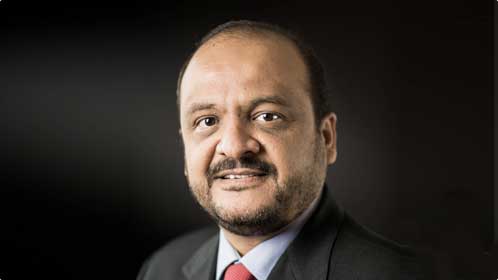Special address by Ahmad O. Al-Khowaiter at the Global Water, Energy, and Climate Change Congress

Ahmad O. Al-Khowaiter, Executive Vice President Technology & Innovation
Bismillah ir Rahman ir Rahim
Excellencies, distinguished guests, ladies and gentlemen. It is my pleasure to be here for this Congress under the esteemed patronage of HE Shaikh Khalid Bin Abdulla Al Khalifa, Deputy Prime Minister of the Kingdom of Bahrain.
I want to use this Special Address to talk about what a realistic energy transition could look like. Let me start by dismissing uninformed hyperbole around hydrocarbons.
Such as suggestions that if the world just stops producing oil and gas, all would be well. This is a completely irrational view. It is like solving the obesity epidemic by asking farmers not to plant next year’s crop. All that will do is lead to starvation.
In fact, stopping oil and gas production would do more than just bring transportation and global trade to a grinding halt. It would also derail the very innovation needed to support the world’s transition to a lower-carbon energy future.
In other words, this is not a zero-sum game.
Rather, an orderly energy transition starts with accepting that we need to take two parallel tracks forward.
Yes, the world needs to continue to develop the capacity of alternatives. At the same time, we need to continue to leverage existing energy infrastructure by seeking ways to further reduce emissions of conventional energy sources.
As we pursue these parallel tracks, we must also be mindful that given global diversity – there is no equitable one-size-fits-all approach. The fact is that energy poverty remains an issue in the developing world where about 800 million people have no access to electricity for example.
Also, recent shocks such as the COVID pandemic or the war in Ukraine have served to emphasize the importance of energy security and affordability. Under such circumstances, chronic under-investment in the established energy system even spurred the return to coal.
Accordingly, we believe the energy trilemma of security, affordability and sustainability need to be at the heart of any pragmatic energy transition approach.
And that is why Aramco, for our part, continue to invest in oil and gas production to help the world mitigate unexpected shocks while also seeking to reduce our emissions through technology and best-in-class engineering practices.
As for the GCC in particular, here, hydrocarbons have provided key sources of economic development – not to mention being currently critical to many aspects of everyday life from the water we drink to the food we eat to the air conditioning in this room.
To state the obvious: our region still has vast oil and gas resources. Equally obvious is the fact that there is also enormous potential for wind and for solar energy in this region.
What all this means is that the pathways to getting to net-zero here within the GCC will be different than in say, Europe. Indeed, for the global energy transition to be truly successful so no country nor region is left behind, it must be multi-source, multi-speed and multi-dimensional.
All of which brings me back to technology, which has enabled Aramco to be among the lowest-cost producers of oil and also have one of the lowest upstream carbon intensities of any major oil company.
Building on this leadership, we continue to invest heavily in research and development across the world. With a particular focus on lower-carbon energy technologies such as hydrogen, carbon capture, synthetic fuels, and innovative carbon-based materials to name just a few.
Let me make one final observation.
Clearly, different people have different words to describe what they think constitutes a lower-carbon energy transition. Words like equitable, just, inclusive, affordable, stable, and so on.
But putting aside such semantics, what is also clear is that to truly make meaningful progress towards a lower-carbon energy future, we cannot prematurely limit our options. Rather, we need to embrace a broad portfolio of energy sources and technologies.
That is the reality. Here in the GCC. In the Global South. And indeed, around the world.


